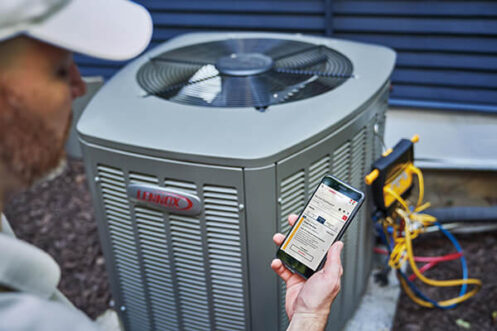
Many people think that air conditioners are easy to shop for, with the choice being efficiency and brand name. However, the biggest difference, even of the same brand, is the size in terms of cooling capacity. Use the following information to help you understand why the cooling capacity is so important and how it’s calculated by professionals like us at IBBOTSON Heating & Air Conditioning Co..
Why AC Size Matters So Much
Before looking at how to determine the size unit you need, let’s take a moment to discuss why it’s so important. Some people think they can skimp a little on the system’s cooling capacity to save a little on the cost of the system. Others think they should go with a higher capacity system because they think it’ll reduce the cooling costs because it’s rated for more cooling output.
The truth is that neither of these work out in the end. Yes, a smaller system will cost less to install, but it’ll cost more to operate because it’ll run constantly. A larger system will cost more for both the installation and the operation. The result of an improperly sized system is that your home won’t achieve the desired temperature, and you’ll consume more energy and put additional wear on your system.
Understanding BTU and Tonnage
An air conditioner’s size refers to its cooling capacity, which is measured in British Thermal Units, also called BTU for short. In some instances, you may find the unit’s capacity is rated in tons or tonnes, which is a different way of looking at BTU. One ton is equal to 12,000 BTU.
One BTU is equivalent to the heat required to raise one pound of water by one degree Fahrenheit. When discussing air conditioning size, the unit will transfer up to the BTU rating for each hour of operation.
Foundational Measurement
The foundational measure for your home’s air conditioner is the serviceable square feet. This may be different than the square feet listed on a real estate listing, depending on how the HVAC system is designed. Be sure to include areas like hallways and staircases. Check your attic, basement, and garage to see if your HVAC system serves them, and add them if there are supply vents.
Home Construction Variables
How your home is constructed will affect the cooling capacity you need from your AC unit. First, consider your ceiling heights in the various areas of your home. The standard conversion from square feet to BTU capacity accounts for standard 8-foot ceilings. However, if you have vaulted ceilings anywhere in your home, you must account for the extra air volume that needs conditioning.
Then you must account for how well your home is sealed and its insulation. For the Arlington Heights area, the Department of Energy recommends a minimum insulation rating of R49 in your attic. This is 14 inches of standard fiberglass batting insulation. The less insulation you have, or the more your home leaks air, the more capacity your system will need to regulate the temperature effectively.
Finally, consider the number and size of your windows, which way they face, and the number of exterior doors. Windows that face south or west allow more heat than north and east-facing windows.
Household Utilization Variables
Now you need to think about various controllable variables in your home. First, consider how many people you commonly have in your home, even if they don’t live with you. Each person produces heat and requires additional capacity from your air conditioner. Next, look at the heat-generating appliances you have in your home, including appliances like freezers and high-powered electronics.
Environmental Variables
Finally, you’ll want to consider environmental variables around your home and how they affect your home’s cooling capacity. Start by considering how much sunshine your home receives during the day or if it’s mostly shaded. You’ll also want to consider whether buildings around your home reflect more light and heat onto your home, increasing its thermal heating.
IBBOTSON Heating & Air Conditioning Co. has been keeping homes comfortable around Arlington Heights since 1946. Our team provides heating and air conditioning installation, maintenance, and repair together with indoor air quality solutions and water heater services. Call to schedule your consultation with one of our knowledgeable AC installation experts to find the perfect size unit for your home.
